Take this five-problem quiz. IMP scoring.
(1) Neither side vulnerable. You hold




As dealer you open 1. Your partner responds 1
, RHO overcalls 1
, you bid2
and LHO jumps to 3
(preemptive). Your partner doubles, and RHO passes. What is your call?
(2) Neither side vulnerable. You hold




As dealer you open 1. Your partner raises to 2
and RHO jumps to 4
.What is your call?
(3) Neither side vulnerable. You hold




The dealer, at your left, passes and your partner opens 1. RHO overcalls 2
,and you try a negative double. LHO jumps to 4
, and two passes follow. What is your call?
(4) Your side is vulnerable. You hold




After three passes, your partner opens 1. RHO overcalls 1
, you bid 1
,LHO lifts to 2
and your partner rebids 3
, RHO competes with 3
. What is your call?
(5) Both sides vulnerable. You hold




Your partner deals and opens 1, and RHO jumps to 5
. What is your call?
Recently I wrote up the deal below for my syndicated column.
| |||
|
| ||
| |||
| West | North | East | South |
1 | 2 | ||
| Dbl¹ | All Pass | ||
| 1 For penalty, vintage 1956 | |||
West speculated with a double, seeing a profit on defense if East could sit for it. Since East had a good defensive hand, he was happy to accept the suggestion.
They picked declarer clean — spade opening lead to the ace, heart shift to the king and ace, Q,
J ruffed by South as East shed a diamond,
K to the ace, spade ruff,
A,
K, third diamond with East overruffing dummy, spade to promote West’s
J. Down four.
My column was a lament. We seldom see such results nowadays — the product of good and bad judgment in the auction — because progress in bidding theory has given us the negative double. In 2006 West would double or bid 2 at his first turn, and even if he passed and East reopened with a double instead of with 2
, West couldn’t make a unilateral decision to play for penalty.
Nowadays every double you hear has some arcane meaning. The penalty double, I fear, is going the way of the dodo. The double has become a sheep in sheep’s clothing, and opponents can bid whatever they like with impunity.
In March, in an allegedly strong IMP game on OKbridge, I watched three consecutive deals that I found mystifying.
| |||
|
| ||
| |||
| West | North | East | South |
1 | Pass | 1 | 1 ¹ ¹ |
2 | 3 | Dbl | Pass |
| ? | |||
| 1 Good grief! | |||
I was trying to calculate the upcoming penalty (and was delighted to see that South was about to get what was coming to him) when West … bid 5! All passed, and the defense got a spade and a trump, Plus 400 to East-West.
West explained that they thought East’s double simply showed values but no clear bid.
| |||
|
| ||
| |||
| West | North | East | South |
1 | Pass | 2 | |
4 | 4 ¹ ¹ | All Pass | |
| 1 Holy guacamole! | |||
North could have taken a sure profit — which would have been +500 — by doubling 4. They made 4
, off two trumps and a heart, but if the
Q and
3were swapped, 4
would have been down and 4
would still be three down.
One wonders if North wanted A-Q-10-8 to double 4
. Could the modern preoccupation with competitive doubles be having an unhealthy side effect? Are players forgetting that they can punish an opponent who puts their neck on the chopping block?
| |||
|
| ||
| |||
| West | North | East | South |
| Pass | 1 | 2 ¹ ¹ | |
| Dbl | 4 | Pass | Pass |
5 ² ² | All Pass | ||
| 1 Perhaps carried away by his success on the first deal | |||
| 2 Arrggh! | |||
This time West had two aces, including the singleton ace of his partner’s bid suit, and two fast heart losers, but they still wouldn’t double. Their� 5 went down two when 4
would have been down three.
About 10 years ago, quiz problem (4) appeared in The Bridge World’s Master Solvers Club. Your side is vulnerable. You hold




After three passes, your partner opens 1. RHO overcalls 1
, you bid 1
,LHO lifts to 2
and your partner rebids 3
, RHO competes with 3
. What is your call?
Most panelists voted for 4, pass (an action that the Law of Total Tricks would support) or 3NT. But a couple of experts thought the correct action was double — after which, no doubt, they expected their partner to know their exact strength and pattern. That was in 1996; I fear there might be more than two doublers now.
(Do you ever ponder, as I do, that pairs who use these all-purpose doubles must face constant ethical problems? Maybe an experienced world-class pair can make such doubles in tempo, but can lesser mortals?)
I can see it now. In the next millennium, an archaeologist excavating a site finds a tattered copy of an old bridge magazine with a description of a deal played at 4 doubled. He is amazed. “Do you suppose,” he mutters, “that a double was once used to increase the size of a penalty?”
This was quiz problem (5):
(5) Both sides vulnerable. You hold




Your partner deals and opens 1, and RHO jumps to 5
. What is your call?
Let’s hope that 1000 years from now, a player will be able to double and not have to fear that his partner will interpret it as a hair-splitting, “card-showing,” you-figure-it-out action.

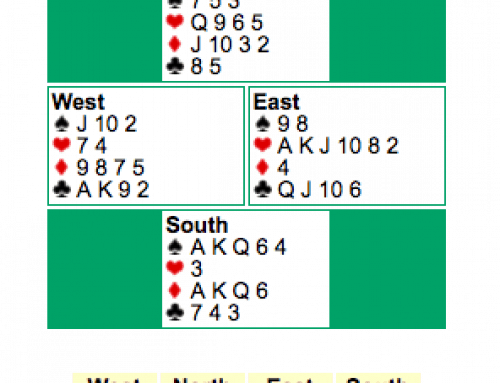
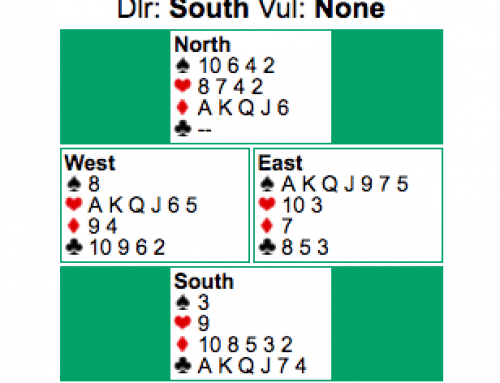
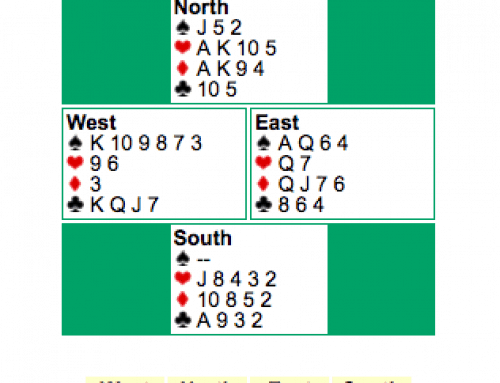
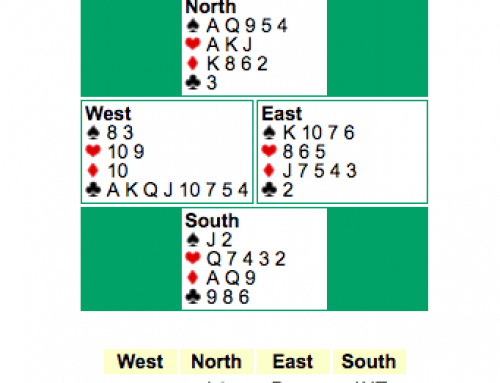
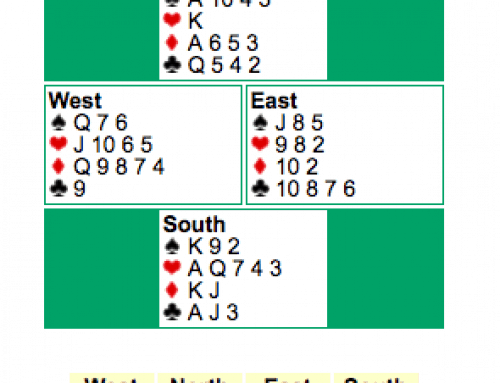
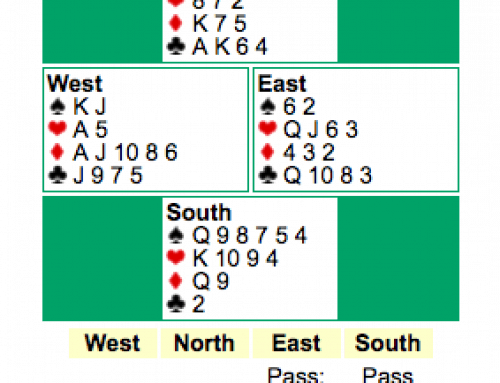
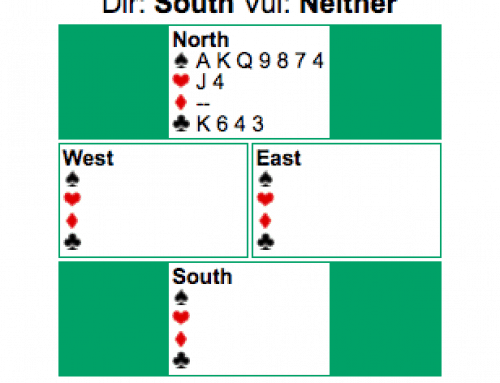
Leave A Comment